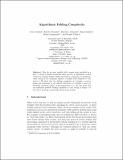Algorithmic folding complexity
Author(s)
Cardinal, Jean; Demaine, Erik D.; Demaine, Martin L.; Imahori, Shinji; Langerman, Stefan; Uehara, Ryuhei; ... Show more Show less
DownloadDemaine_Algorithmic folding.pdf (441.2Kb)
OPEN_ACCESS_POLICY
Open Access Policy
Creative Commons Attribution-Noncommercial-Share Alike
Terms of use
Metadata
Show full item recordAbstract
How do we most quickly fold a paper strip (modeled as a line) to obtain a desired mountain-valley pattern of equidistant creases (viewed as a binary string)? Define the folding complexity of a mountain-valley string as the minimum number of simple folds required to construct it. We show that the folding complexity of a length-n uniform string (all mountains or all valleys), and hence of a length-n pleat (alternating mountain/valley), is polylogarithmic in n. We also show that the maximum possible folding complexity of any string of length n is O(n/lgn), meeting a previously known lower bound.
Date issued
2009Department
Massachusetts Institute of Technology. Computer Science and Artificial Intelligence Laboratory; Massachusetts Institute of Technology. Department of Electrical Engineering and Computer ScienceJournal
Algorithms and computation : ... International Symposium, ISAAC ... : proceedings.
Publisher
Springer
Citation
Cardinal, Jean et al. “Algorithmic Folding Complexity.” Algorithms and Computation. Springer Berlin / Heidelberg, 2009. 452-461. (Lecture notes in computer science, v. 5878.)
Copyright © 2009, Springer
Version: Author's final manuscript